Previously on Drokk!: If there was one thing we learned from the last episode, it’s that Jeff and I are more responsive to the Dredds we’re reading right now when they’re building something towards the larger continuity, rather than the one-off comedy strips that we’ve been reading for more than 30 volumes at this point. So what happens when we hit a volume that’s almost all one-off strips…?
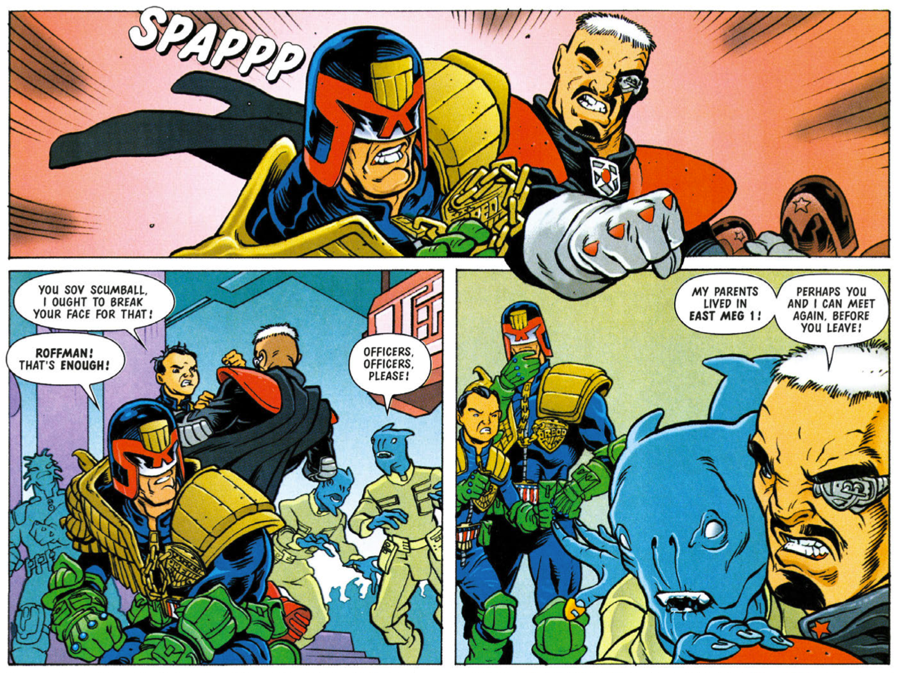
0:00:00-0:02:33: So here we are, reading Judge Dredd: The Complete Case Files Vol. 33, reprinting and collecting material from 2001’s 2000 AD and Judge Dredd Megazine; in short order, we introduce ourselves, the book, and I make a Block reference that is really just obscure and dumb in how it relates to this volume. I should be ashamed.
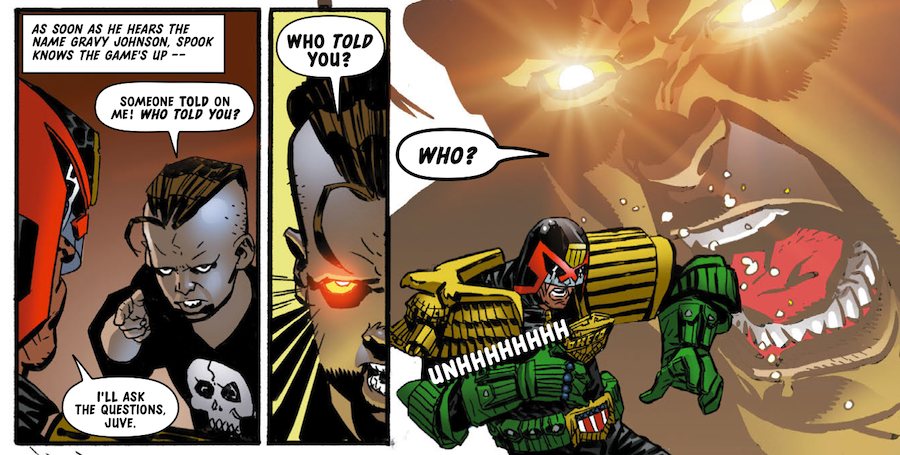
0:02:34-0:06:22: One of the things that’s notable about this volume — one of the few things; we spend time here talking about that this is another volume that is just fine,” even if that actually means “of high quality, but unremarkable in that because so many of these volumes are of such high quality” — is that it sees Gordon Rennie and Robbie Morrison installed as the new back-up writers to John Wagner, and it’s a good thing as both get Dredd in a way that we’ve not seen other writers manage before. In fact, two of Jeff’s favorite stories in the volume — “Relentless” and “Hell Bent” — are Morrison’s; my favorites are “The Runner,” “The Chief Judge’s Man,” “Bodies of Evidence,” and “Lawcon,” with Jeff sharing some admiration for the latter, as well.

0:06:23-0:20:24: We talk about what does and doesn’t work about “The Chief Judge’s Man,” and actually tend to agree on most of it, even though I rate it far more highly than Jeff due to a complete critical blindspot with regards to nostalgia around Will Simpson’s artwork. (I should have added in the podcast, but didn’t: this blindspot is a late onset thing, and only really exists with his Dredd work. I still dislike both his Hellblazer and Rogue Trooper work, oddly enough.) Nonetheless: we like the paranoia, we like the antagonist, but Jeff thinks that it’s just a little too on the nose and obvious, especially with the name of one particular character. He’s probably right! We also talk about “Relentless,” which has the opposite problem to “Chief Judge’s Man,” in that the art ends up elevating the writing, with Colin Wilson drawing the shit out of what, to me at least, is a relatively run-of-the-mill Cursed Earth adventure. (That said, it’s “run of the mill” to a Wagner degree, which is pretty fucking amazing for a neophyte Dredd writer like Robbie Morrison.) Also under very brief discussion, “The Moby,” a one-off story notable mostly because it’s an example of Jeff’s beloved trope of “Dredd versus an out of control vehicle.”
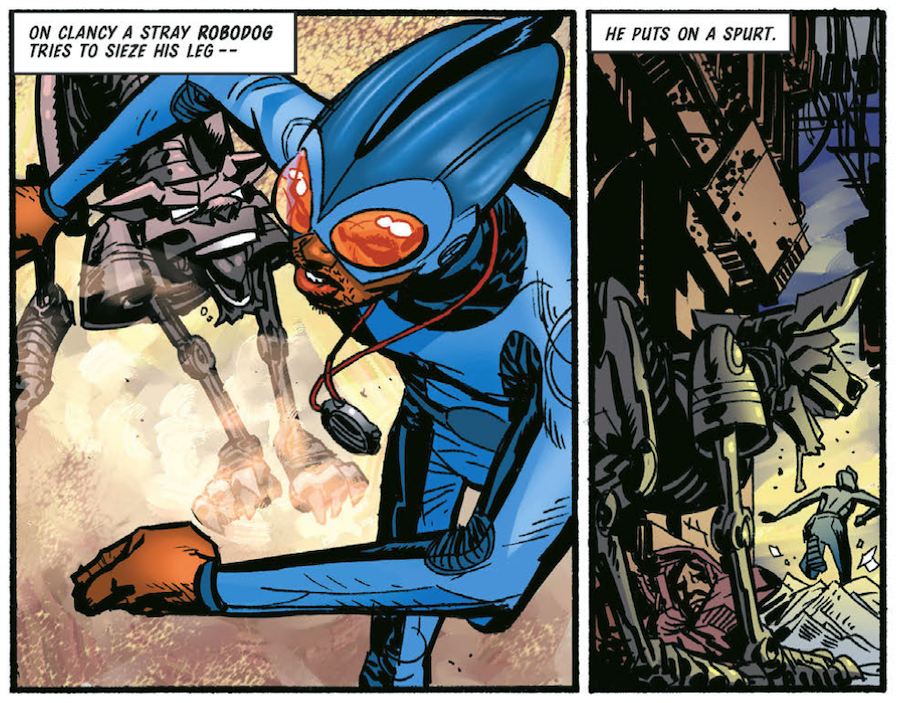
0:20:25-0:40:07: “The Runner” is one of my favorite stories in this volume by far, but Jeff is not convinced because of the fact that it breaks a fourth wall too far by nature of featuring a Black man shot by police. We go back and forth about what works and doesn’t work for each of us in this one-off — I can’t get over that last line, but Jeff makes a particularly interesting argument in favor of it, surprisingly — and why it might feel out of place surrounded by comedy strips and not expanded outwards. (Jeff also mentions two changes he thinks would have made the strip better, at least one of which I think is entirely there in the comic itself.) Also: Duncan Fegredo’s a really good artist, everyone.
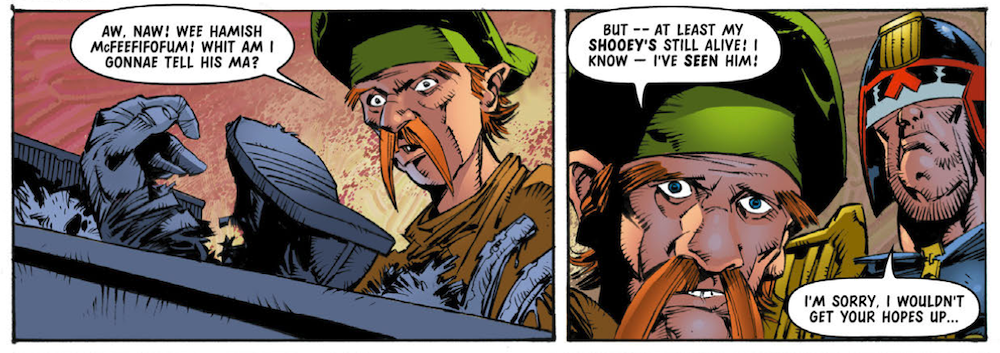
0:40:08-0:51:46: We run through another couple of my favorite stories: “Bodies of Evidence,” a ridiculous romp that distinguishes itself through Cam Kennedy artwork and some great character names — Ivana Freebie is an all-time classic, let’s be honest — and “Lawcon,” which answers that question on everyone’s lips: “What if John Carpenter’s The Thing, but Judge Dredd?” If that doesn’t sound like a good time to you — even with the art of Richard Elson, which could best be described as “too pedestrian for Dredd, but not bad per se.” (He’s done some other work for 2000 AD that I actually like a bunch; his stuff here isn’t particularly great, though.)
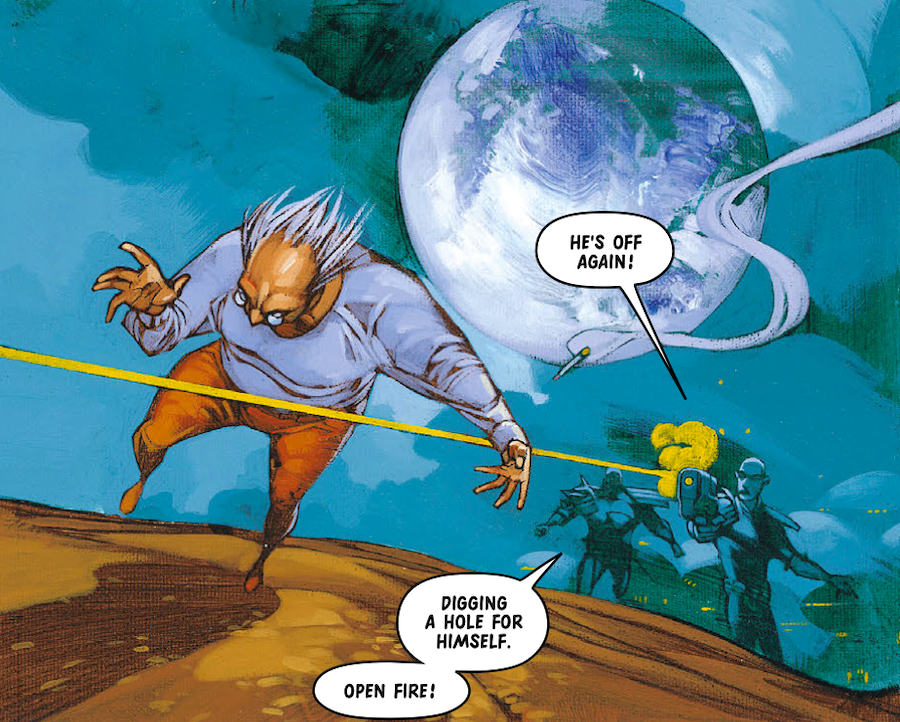
0:51:47-1:19:11: We return to a subject we’ve touched on a bunch in recent episodes… namely, how difficult it is to find something new to say about work that is good, but itself not really saying anything new. Is the problem us, or the comics? (I think it’s the former, Jeff seems to believe otherwise.) It’s not just navel gazing, though; Jeff has a theory about the lack of psychological depth in the supporting characters of Dredd as written by John Wagner, and we also talk about whether “Foot Patrol” or “Kicking the Habit” is the worst story in the volume. Spoilers: it all comes down to art in the end, at least for Jeff. Siku might be an evocative painter, but he’s really not big (or good, for that matter) on narrative work. Meanwhile, I’m still struggling with Wagner actually naming a character “Judge Hitler,” because what the ever-living fuck. All this, and Jeff making a casino metaphor about the tightness of slots that I’m still not entirely sure I understand.
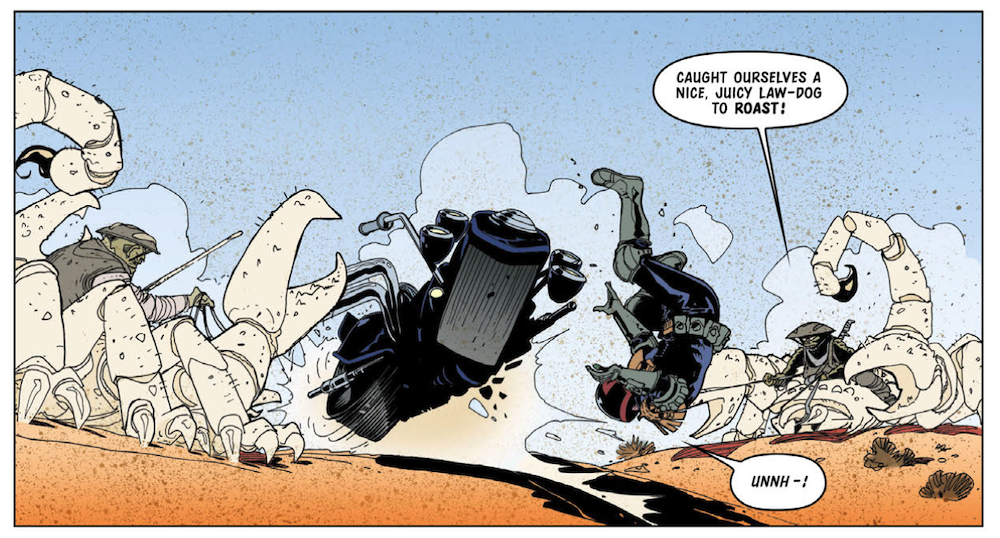
1:19:12-end: We’ve already gone through favorite stories and least favorite stories, so there’s only one last thing to get up to: Drokk or Dross? After sorting that question out, it’s time to wrap things up, mention the Twitter and the Patreon, and look to the future with hopeful hearts and a dream that we’re going to get some more continuity heavy material. (If nothing else, there is a sequel to “The Chief Judge’s Man” with art by Colin MacNeil.) As always, thank you for listening and reading.


Haven’t listened to the episode yet, but I believe this volume marks a milestone for Drokk as the first volume that was released (May 2019) after you started doing Drokk (February 2019).
Scattered thoughts:-
– I think our hosts’ discussion of The Runner sort of danced around the issue. The victim is black, but it’s pretty clear that he’s only incidentally black. The story doesn’t present him as shot *because* he was black; a white character in the same Judge Dredd story, according to the rules of Judge Dredd stories, would also have been shot.. That’s what makes it feel so off (I’m with Jeff Lester).
If anything (and here I’m also with Jeff Lester) it reveals the Achilles’ heel of Judge Dredd. You have to be very careful about putting a nonwhite character in the role of anyone other than a judge. I think that part of the implicit bargain with the reader that keeps the reader from throwing down the authoritarian fantasy is that the conceit is that the judges are oppressive to everyone. It’s again that thing where I don’t think it’s quite right to call Judge Dredd fascist, because fascism is about mobilizing the national community against hated others. Dredd is more like the liberal order stripped of democracy, humaneness, and well, liberalism — which is to say he’s paradoxically about the idea of equality and fairness under the law, in the sense that he treats all people equally terribly. No-one is safe from a crime swoop. That side of Dredd is even idealized, better than reality. In the real world, state power doesn’t work like that at all: some groups are privileged, others are not.
So the idealization collapses if you draw attention to the ways in which the liberal order doesn’t actually live up to its own ideals in the real world. The moment there’s a whiff that Dredd singles out black people for brutality, and lets white people get away with stuff — at that point, Judge Dredd stops working as a concept. When the strip needs marginalized groups, it resorts to fantasy, mutants and aliens, to keep it safely distanced from reality. When it presents people who in the real world would be marginalized, it avoids making them citizens who suffer at the hands of the judges. For instance, in this volume the two Mega-City kids in The Bad Juve are black, but they’re not in conflict with the judges.
And when in The Runner you blunder into depicting something that does resemble the real world, it slaps you in the face with how oblivious it is to what it’s depicting.
-On that note, one thing that has slowly been changing about Mega-City One is that it’s acquired an immigrant population of comedy space aliens. I wonder if Wagner was starting to feel that he was running out of room to make jokes about ethnic stereotypes.
– On another note, if our hosts want something to talk about when reading these, we are rapidly approaching the point at which these comics will have been written after 9/11. That obviously had a big impact on how people thought about a whole load of issues that are themes of Judge Dredd.
One way in which this volume felt hollow to me is that it’s more “Judge Dredd” stories that don’t obviously engage with real issues. It’s telling that The Chief Judge’s Man is telling a very 1970s story about a psychologically damaged Vietnam veteran who has been brainwashed into being a double-agent who thinks he’s being patriotic. It’s based on recycling old media tropes, not about drawing on what was actually happening. Will that be sustainable after 9/11?
– I can’t say that I’m as keen on Robbie Morrison and Gordon Rennie as our hosts. Rennie in particular comes across to me as having a fair bit of Garth Ennis’s fanboy admiration for Dredd about him — see the story about the dead of Necropolis and the way in which Dredd is presented as a figure of unassailable moral authority. Robbie Morrison is maybe a bit like that too. Not as much, but definitely someone whose approach to the strip seems shaped by having grown up reading it and loving it. Varney the Vulture is a fairly naked attempt to redo that talking fanged horse from the story about the spiders.
I put this into the comments on the last Drokk, but it was super late (you’d already posted the next Wait, What by the time I wrote this out) so I’ll drop this in here, because why not self-plagarize? And it’s still relevant, given where the strip is at the moment.
The best term I head to describe your difficulties discussing Wagner’s level of quality is the Golden Rut, though rut has negative connotations to it that don’t apply to Wagner, since he is constantly trying to find new angles and approaches to his work. I feel like Wagner and Dredd have entered the same space Stan Sakai has on Usagi Yojimbo, or the Hernandez Brothers, or Jim Aparo back in the 80s on Batman, or John Allison’s body of work, an consistently high quality but not flashy approach to simply doing the work at the highest level they can, to the point where it fades into the background of the industry churn. It is the kind of work that can immensly reward long time readers, but is the exact opposite of the shock of the new that drives so much attention. No one is suprised when the latest Usagi Yojimbo is rock solid, that’s like being surprised that water is wet.
It should be noted, though, that I remember people standing up and taking notice of Wagner and Dredd about a decade ago, starting with Origins, through the Tour of Duty sequences, culminating in Day of Chaos. So he has been able to break through to remind people how good he is, though all of those stories are big, attention grabbing stories, the exact opposite of what we’ve been seeing over the last few volumes.
Big ups to Voord’s analysis of the blind spots for Dredd and how the ‘state’ works in the series. I’m reminded of a critique I read of films like Contagion, Outbreak, and other disease based films in light of how we’ve seen everyone react to COVID. These films build their tension by showing the extreme lengths scientists and governments take to control a viral outbreak to show the degree of danger of the virus. Everyone in the film takes the virus seriously, once they realize it’s a thing, and no one stages a protest demanding to take off their masks. If your film is about how scary a virus is, you can’t make the outbreak the fault of poor government response, because the audience will think the government and scientists are incompetent, not that viruses are scary. The story of every governments response to the COVID outbreak would be the Chernobyl miniseries from last year, not Outbreak.
So the Judges have to be equally oppressive to everyone, with no special focus on racism or sexual orientation, because that pulls away from the thought experiment the strip was built off of, which was “What if all cops were Dirty Harry?” What we see with the Runner, as has been discussed, is the way the boundaries of that thought experiment can prevent the strip from reflecting reality, because the Judges would never opperate in real life the way they do in the strip. I would argue the strengths of the strip outweigh the limits The Runner displays, since the broader point of the strip, that police powers cannot actually address social problems, and attempts to do so inevitably result in horrible outcomes, can’t be waved away with the Bad Apple, if only the police were better, style arguements that defund the police/police abolitionists contantly have to address. The Judges opperate the way Thin Blue Line assholes think police work in the real world. And guess what? They’re still terrible, and can’t actually solve any of the problems facing Mega City One. I think that point is still important to make. It does deform the strip, though, as we see plenty of corruption in the Judges, but it’s always buit off of greed or lust, never racism or homophobia. There will never be a subset of the Judges that believe in QAnon, for instance.
Finally, this is the last Case File before 9/11. I was a freshman in college at the time, but this casefile, and Wagner’s recycling of old tropes like Voord noted, feels like the same malaise that filled the end of the Clinton years and the first 8 months of Bush’s term. Blair’s in office, Bush hasn’t done much of anything, in retrospect everything just seemed in a weird limbo. The 90s were over but still lingered, and no one knew what was next, with the biggest new thing being the Matrix. I remember friends getting excited about the Lord of the Rings film and Star Trek Nemesis at the time, to show where a small part of the zeitgeist was. It makes sense that Wagner would be adrift at the moment, he didn’t have anything new to respond to.
The last several volumes, where the consistency has become off-putting, shows how the material being released weekly and then collected into the (mostly) all-inclusive Case Files leads to lukewarm readings. You all have discussed this before, but weirdly it becomes an issue when the stories are all okay to solid with Wagner holding steady, unlike a lot of the earlier volumes which could be good, bad, or in between, but lacked that decent but underwhelming through line of the past several books. If you look at the trade program from years ago, this is the era when they were putting out a collection like Brothers of the Blood, which deals with the Rico clone stories, that collects scattered material from over a 3.5-4 year period. Same with Chief Judge’s Man and how it’s parceled out over years with what you could describe in a good sense as one offs, or after the last few volumes, closer to filler. That random potential of the earlier Case Files has been gone for a while, and it’s become a detriment. I go back and forth on whether the Case Files are always a good way to collect and read the material.
All the material since The Pit has been new to me, so I was curious when we got to this era, based on those earlier trades, to see if these separate storylines coalesced in any way since the individual chunks would be read in order of publication, outside of how they’re grouped together in the corresponding trades. But so far that hasn’t happened. Dredd has always had a continuity that is in some ways tight and in others very loose, reflective of the publishing schedule, for better or worse.
One thing about Dredd that others have said and I agree with, is that it is often readable, even when the material is bad, but these last few volumes are kind of the opposite. I even appreciated those Alan Grant stories from a few volumes back that were terrible because they were at least a massive tonal shift from Wagner as a kind of diversion. Enough bad can’t be said about most of the coloring since the heavily painted era ended, either.